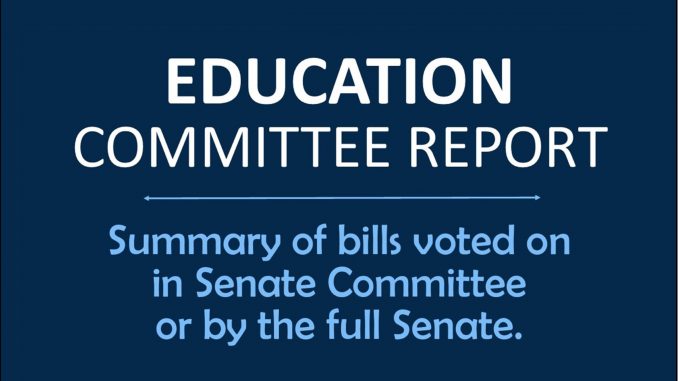
SF 139 Financial literacy graduation requirement delayed
SF 206 – Special Education Taskforce Request
SF 207 – Peace officers to teach drivers education
FLOOR ACTION:
SF 139 Financial literacy graduation requirement delayed
SF 139 extends the requirement that all high school students enrolled public or nonpublic schools take a one-half unit course in personal finance literacy as a condition of graduation through the 2022-2023 graduating class. In 2018, the Legislature passed and the Governor signed a new graduation requirement for a half course in financial literacy. In Code, the Legislature spelled out that the curriculum, at a minimum, covers nine areas of financial literacy as outlined by the Department of Education. When first enacted, the financial literacy requirement for graduation was to go into effect July 1, 2019, for the FY20 school year. Because many high school students have their coursework planned out several years in advance, this put current high school students in danger of not completing graduation requirements due to lack of space in their schedules to accommodate another required class.
While there is not a state fiscal impact associated with SF 139, there may still be costs to school districts related to the financial literacy course requirements. The original costs were estimated to be between $1.6 million to $2.2 million annually and were largely based on the probability that school districts would need to hire additional teaching staff. The course requirements were later amended and expanded how the financial literacy coursework could be incorporated into existing classes. The changes are expected to reduce the estimated costs.
[2/18: 48-0 (Excused: Miller-Meeks; Vacant: Danielson)]
COMMITTEE ACTION:
SF 206 – Special Education Taskforce Request
SF 206 requests an interim study committee regarding special education program requirements and outcomes for students with individualized education programs (IEPs). The study committee will review state and federal laws, inclusion requirements and placements, and evidence-based practices, and develop a transfer process for students to go between inclusive general education classrooms and special education classrooms. The study committee will submit a report with its findings and recommendations to the Legislature and to Iowa’s congressional delegation by December 20, 2019.
A committee amendment adds parents of a special education student and parents of a general education student as required participants on the taskforce. The amendment also moves the report submission deadline back one year for ample time for the taskforce to complete its work.
[2/18: Short Form (Ragan on Committee)]
SF 207 – Peace officers to teach drivers education
SF 207 allows a peace officer or retired peace officer to teach drivers education without authorization from the Board of Educational Examiners (BOEE). Under current law, to be qualified to provide street or highway driving instruction, a person must be certified by the Department of Transportation and authorized by the BOEE.
A committee amendment deletes from the bill a peace officer’s ability to teach the classroom portion of driver’s education. However, it does keep the portion of the bill that removes peace officers that teach drivers education from authorization under the BOEE. This means these instructors will no longer be governed under the BOEE’s professional ethics. The amendment limits which peace officers qualify by excluding parole officers. It defines peace officer as a sheriff, city police officer, officers under public safety and DOT public safety officers. The amendment requires peace officers to have at least five years of experience. The amendment will allow retired peace officers, if they have a driver’s license valid for more than two years from date of issuance.
[2/18: Short Form (Ragan on Committee)]
